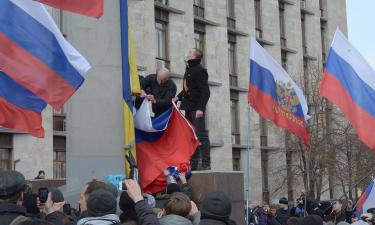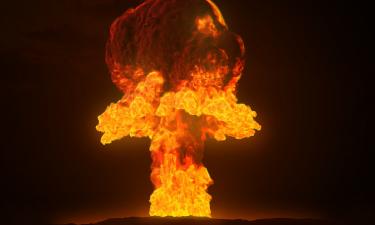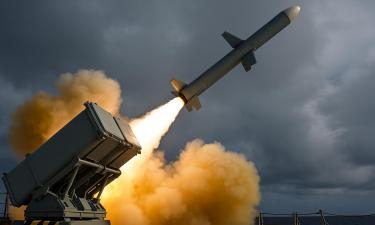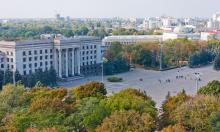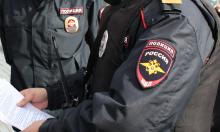Gusinsky Has No Influence in Today's Russia
 The arrest of the former owner of Media-MOST empire Vladimir Gusinsky did not stir any particular interest in Russia
The arrest of the former owner of Media-MOST empire Vladimir Gusinsky did not stir any particular interest in Russia
Russian society was rather perplexed by the situation. Why? What for? Who wants to keep the former oligarch behind the bars?
The Russian media last focused on Gusinsky in 2001, when a Spanish court refused to extradite the former oligarch to Russia, where the Prosecutor General's Office has charged him with embezzlement. Preceding this event was a long and scandalous conflict between Media-MOST and its major creditor - Russian gas monopoly Gazprom.
Mr.Gusinsky created his media empire with virtually state funds alone, by opening the private national TV channel NTV in 1994, establishing several publishing businesses and acquiring several small radio stations and TV channels. His debt to Gazprom, partially owned by state, came to $500 million by the year 2000.
Gazprom was not his only creditor. Vneshekonombank, the Central Bank and Moscow government had also lent him money. As you can imagine, all these structures did not finance the oligarch seeking future profits. They were rather forced to do it. Vladimir Gusinsky, like Boris Berezovsky, another media tycoon currently residing in London, is considered to be a major architect of the oligarchic model of capitalism in Russia under Boris Yeltsin. Mr.Gusinsky maintained rather informal relations with Yeltsin's entourage and family, and provided the necessary propaganda services to the Kremlin on a mutually beneficial basis. For example, many experts believe that Yeltsin's victory during 1996 presidential elections was orchestrated by a massive TV propaganda campaign.
It would be unreasonable to deny the fact that seemingly commercial conflict had a distinctive political connotation and developed against a particular historical backdrop. At the end of 1999, Boris Yeltsin resigned, and in March 2000 Vladimir Putin was elected the Russian president. He immediately directed his efforts to push the oligarchs out of the corridors of power. Gusinsky's media empire took more than just a critical stand in relation to Mr Putin. It actually launched a large-scale campaign of destructive informational pressure on the president, which the Kremlin saw as a threat to the country's political stability.
At the end of 2000, Gazprom demanded that Gusinsky pay his debt or sell his shares in the empire. Gazprom's demands were regarded by liberal political circles as an attack on the independent media and a violation of freedom of speech. However, the efforts of liberals to convince society of the righteousness of their cause and organise mass protests against Gazprom's attempts to acquire the controlling stock of NTV were unsuccessful.
The position of the Russian Union of Industrialists and Entrepreneurs (RUIE), the most influential corporate organisation of businessmen in Russia, in relation to the Media-MOST situation is particularly noteworthy. "We totally understand the creditor's desire to get back the invested capital," a statement read. "All borrowers, including the most independent mass media, should pay off their debts. They must return the money or bargain on a commercial basis, without recurring to accusations of 'violation of the freedom of speech or 'attacks on democratic achievements.' We do not want Russian television to fall under state control, but at the same time we reject the idea of some private owner using the media to manipulate public opinion against the authorities."
As a result, Vladimir Gusinsky did not manage to protect his commercial interests. His media empire was acquired by Gazprom, and he ended up in emigration. In 2001, despite his arrest in Spain on Interpol's request, he was not extradited to Russia, and for a while managed to escape public scrutiny quietly conducting business in Israel, because he also has Israeli citizenship. Initially, the Russian mass media assumed that his recent arrest in Athens was the result of some random mistake or confusion. After all, the 2000-2001 conflict had been almost completely forgotten; Mr Gusinsky had cleared all his debts one way or another; and Gazprom had long dropped all its claims against the former oligarch. It could have been the case that Russian Prosecutor General's Office had simply forgotten to cancel its international warrant for arrest and extradition of Mr. Gusinsky. However, as it is now clear that there was no confusion in this case whatsoever. The Athens authorities received a request to arrest Mr. Gusinsky last spring under a bilateral treaty on mutual legal assistance.
Russian political analysts have so far been unable to explain the new collision between Mr.Gusinsky and the Prosecutor General's Office. It is obvious that the country does not need one more international scandal on the eve of parliamentary elections in December of 2003, taking into account the fact that another political scandal with international repercussions is still continuing in Russia - the arrest of Yukos co-owner Platon Lebedev.
Russian society is split over the possible chances of seeing Mr Gusinsky in front of Russian prosecutors. Some experts believe that Athens authorities will refuse to extradite Mr Gusinsky. After all, the precedent has been already set, because Spain, Greece's partner in the European Union, let the Russian businessman go free after five months of investigation in 2001. Other political analysts assume that Mr. Gusinsky could be extradited, after all.
What can the former oligarch expect if he returns to Russia? The Russian media is already making comparisons with the case of Media-MOST senior financial officer Anton Titov. Accused of the same crimes as Mr.Gusinsky (the illegal transfer of Gazprom funds to private overseas accounts in 1998-1999), he was sentenced to three years in prison, but then immediately released under the terms of an amnesty.
Nevertheless, almost all political experts agree that Gusinsky's arrest will not harm the investment climate in Russia. The significance of his case should not be exaggerated because Gusinsky's influence in Russia has long been a thing of the past.
Marina Shakina, RIA Novosti political analyst
 The arrest of the former owner of Media-MOST empire Vladimir Gusinsky did not stir any particular interest in Russia
The arrest of the former owner of Media-MOST empire Vladimir Gusinsky did not stir any particular interest in Russia